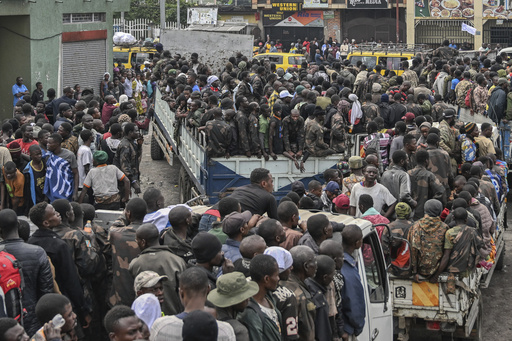
ABUJA, Nigeria — In recent weeks, M23 rebels, supported by Rwanda, have made significant territorial gains in the eastern Democratic Republic of Congo, seizing two important cities amidst a notable intensification of hostilities against an overstretched Congolese army.
The M23 rebels first captured Goma in North Kivu last month and then advanced to Bukavu this weekend, marking a remarkable escalation in their decade-long insurgency and heightening fears of broader conflict in the region.
The M23 faction is one of around 100 armed groups operating in eastern Congo, but it stands apart as it predominantly consists of ethnic Tutsis who have been unable to integrate into the national military.
The group claims it is defending Tutsi individuals and Congolese citizens of Rwandan descent from discrimination.
However, critics argue that their actions, backed by Rwandan military support, are merely a cover for seeking political and economic dominance in the resource-rich eastern Congo.
Rwandan President Paul Kagame has expressed dissatisfaction with Congolese President Felix Tshisekedi, accusing him of neglecting the rights of Congo’s Tutsi population and disregarding past peace agreements.
The recent takeover of Goma involved intense combat with Congolese forces, resulting in significant casualties and numerous surrendering troops.
However, the M23’s advance into Bukavu was reportedly much less contested, with many Congolese military units fleeing in the face of the assault, indicating a lack of organized resistance.
Analysts from the International Crisis Group suggest that the timing of the M23’s aggressive push could be attributed to the weak opposition they faced, essentially encountering minimal barriers to their advance.
Efforts by the international community to resolve the burgeoning conflict have yielded little success.
While various nations are calling for dialogue and a withdrawal of rebel forces, there has been an apparent reluctance to apply the kind of pressure on Rwanda that was evident during the M23’s previous incursion in 2012.
A summit attended by leaders from eastern and southern Africa underscored the need for an immediate ceasefire but did not push for the withdrawal of M23 forces from Goma.
Observers note that this lack of vigorous international intervention may stem from a collective guilt over past failures to prevent the 1994 Rwandan genocide, alongside Rwanda’s rising profile under Kagame’s leadership on the continent and beyond.
Murithi Mutiga, who directs African affairs at the International Crisis Group, has pointed out that African countries need to take responsibility for overlooking the warning signs that led to this recent escalation.
He suggests that the current situation reflects a disappointing breakdown in African mediation efforts.
The risk of the conflict evolving into a regional war looms large, particularly as neighboring countries have become involved.
Congolese President Tshisekedi had previously invited other regional armies to intervene as tensions with the M23 resurfaced.
Tragically, some allies of Congo have incurred losses, including the deaths of 14 peacekeepers from South Africa.
There have also been reports of attacks on Burundian troops by M23 fighters.
“The risk of a regional confrontation has never been greater,” Mutiga warns.
Historical context amplifies these concerns, recalling the devastating conflicts from 1996 to 2003, where surrounding nations and various armed factions battled over access to valuable resources, leading to the deaths of approximately 6 million people.
In response to the crisis, President Tshisekedi has vowed retaliation and continues to urge the global community to exert pressure on Rwanda, which he believes has not been adequately addressed.
Despite Congo’s willingness to engage in discussions—conversations that M23 has also shown readiness for—officials in Kinshasa insist that any negotiations must abide by previously established peace agreements rather than conceding to the group’s escalation.
On the flip side, M23 is pursuing political power, framing its operations as a fight against corruption and poor governance within the areas it currently controls.
The group has stated it is open to “direct and sincere” dialogue aimed at identifying the underlying issues driving the conflict, proposing a ceasefire contingent upon the cessation of the Congolese military’s operations in the region.

